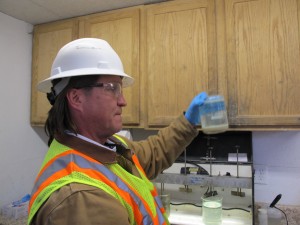Water, Water, Everywhere
-
Susan Phillips

Susan Phillips / StateImpactPA
A worker at a wastewater recycling plant that services Cabot Oil and Gas holds up a beeker of treated water. The water is reused to frack new wells for Cabot. Residual solids are sent to a landfill.
A new report sponsored by the Natural Resources Defense Council examines wastewater disposal methods used in Pennsylvania and comes to the conclusion that, well, none of them are safe. It’s a good explainer on what happens to both “flowback” water (what comes up after a well is fracked) and “produced” water (what comes up after the well starts producing gas). Both can contain high levels of salts, hydrocarbons, heavy metals and naturally occurring radioactive material.
The report is co-authored by Carnegie Mellon University professor Jeanne VanBriesen, and partly funded by the William Penn Foundation. It looks at the methods and impacts of five wastewater disposal options including recycling and reuse for drilling operations, treatment and discharge, deep well injection disposal, and reuse for outside benefits such as dust cover, and road ice removal.
Natural gas producers in Pennsylvania have been increasing their use of recycled wastewater by using it again to frack a new well. VanBriesen writes that although recycling wastewater is the best option, it still requires some disposal.
“Regardless of the treatment option selected, there will be residuals: concentrated brines and solids containing the chemicals removed from the produced water. Management of these residuals is just as critical as management of the original produced water.”
For more of the reports’ analysis of the wastewater treatment methods and their impacts, click here.
















